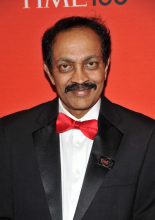V. S. Ramachandran, a leading neuroscientist from India who has taught in the United States since 1983, is prominent for his hypothesis that religious experience is linked to temporal lobe epilepsy. He is also a bestselling author of books on brain science and has argued, contrary to many naturalists, that humans are “unique” in their mental qualities compared to other species. Descended from a prominent family in India, Ramachandran earned his advanced degree at Cambridge University and is director of the Center for Brain and Cognition at the University of California, San Diego.
Vilayanur Subramanian Ramachandran was born in Tamil Nadu, India in 1951. His father was an engineer and traveling diplomat, and his grandfather one of the architects of the modern Constitution of India. Ramachandran first pursued studies in medicine. He attended medical school in Madras, India, and Bangkok, Thailand, and obtained his doctorate at Trinity College, Cambridge. His early research career included collaborations with the physiology department at Oxford and two years at the California Institute of Technology, where he worked with Jack Pettigrew, a pioneer in understanding the neurological basis of visual experiences. Ramachandran began his teaching career as a psychology professor at the University of California, San Diego, in 1983. He is also adjunct professor of biology at the Salk Institute.
Although Ramachandran’s early work was on visual perception, he is best known for his experiments in behavioral neurology. He has expressed the hope that his research will help in solving the problems of autism and other neurological disorders. He has published over 180 papers in scientific journals. Scientific American has invited him to write five “review” articles that updated the current state of neuroscience field. During the “Decade of the Brain,” from 1990 to 2000, he was a prominent speaker at many related events, and he has also produced television programs with Channel Four TV in Britain and the Public Broadcasting Service in the United States. His general-interest book, The Tell-Tale Brain, a story of his career and findings, reached the New York Times bestseller list in 2011.
In 2005 Ramachandran was awarded the Henry Dale Medal and elected to an honorary life membership by the Royal Institution of Great Britain. His other honors and awards have included fellowships from All Souls College, Oxford, and Stanford University; the Presidential Lecture Award from the American Academy of Neurology; and two honorary doctorates. In 2003 he gave the annual BBC Reith Lectures and was the first physician/psychologist to give the lectures since they were begun in 1949. Ramachandran delivered the annual Jawaharlal Nehru Memorial Lecture in New Delhi, India, in 2010. More recently the president of India awarded him the nation’s second-highest civilian honorary, the Padma Bhushan. TIME magazine has put Ramachandran on their list of the 100 most influential people in the world. He is also an India Fellow, National Academy of Sciences.
Ramachandran’s research articles and summaries have appeared in journals ranging from Nature and Science to Perception and Vision Research; PLoS Biology; Journal of Neurology, Neurosurgery, and Psychiatry; Archives of Neurology; Brain; Neurocase; and NeuroReport. His books include The Tell-Tale Brain: A Neuroscientist’s Quest for What Makes Us Human (2011), A Brief Tour of Human Consciousness: From Impostor Poodles to Purple Numbers (2004), The Emerging Mind (2003), Encyclopedia of the Human Brain (2002), and Phantoms in the Brain (1998).



